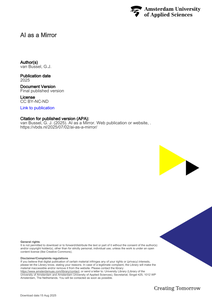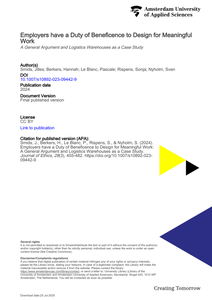Thesis: Ethics work (Banks 2012, 2016) is a stimulating concept for the ethical improvement of inter-professional cooperation. Outline: Starting point: ideal-typical professionalism Introduction to ethics work Professionalism requires inter-professional cooperation Inter-professional expansion of ethics work Final remarks and further challenges
DOCUMENT

In this article, we describe a study on the impact of an ethics program aimed at strengthening the ethical agency of 15 social workers of three welfare organizations. The goal of the study was to make an inventory of the impact of the program, and to evaluate the relevance of this impact with the help of several stakeholders. The most significant change (MSC) approach was used as a research strategy, though some changes to the approach were made with a view to our research goal. We explain the MSC approach and how we used it in our study design. Further, we describe the research process, answering the question whether our adaptation of the MSC was helpful to inventory the impact of our ethics program and the evaluation of its relevance. The implications of MSC's focus on "most significant" changes and the need for a thorough feedback of the results of the evaluation process in the participating organizations are discussed.
MULTIFILE

This thesis is about dilemmas, discretionary space and ethics in public welfare. In my position as a lecturer of ethics in socio-legal practices I am concerned with the way in which these practices open up to an ethical development of their professionals. Thus, this thesis is a search for the most fundamental themes and issues in understanding and judging public welfare as a, perhaps, ethical socio-legal practice. In the field of public services professionals function as the intermediary between government and citizen. In their daily work public welfare professionals take care of the important societal task and goal of poverty alleviation. During the last decades, public welfare has developed into a civil right that involves many obligations on the part of the client in return. The requirement to see to it that the client fulfils these obligations has complicated the public welfare professional’s task of helping citizens in need.
DOCUMENT

People with disabilities (PWDs) face discrimination in the hospitality workplace. The aim of this paper is therefore to frame issues surrounding the employment of PWDs in the hospitality industry in normative ethical terms. To achieve this aim, we conducted twenty-eight semi-structured interviews with owners/managers of hospitality businesses and other relevant stakeholders. Drawing on the ethics of justice and ethics of care, our study found that when organisations demonstrated to their employees and other stakeholders the fairness in the procedures taken to implement PWD inclusion actions, the inclusion actions were significantly supported by coworkers, and the organisations were able to achieve distributive justice and care for PWDs. This study, thus, demonstrated that organisational members were willing to take part in caring actions for employees with disabilities (EWDs) not only when they perceived that inclusion actions for EWDs were procedurally fair, but also when they perceived that the PWDs deserved distributive justice outcomes.
MULTIFILE
Een betere financiële sector bereik je sneller met deugden dan met regels. Toch wordt na iedere missstand de regelgeving aanscherpt, zonder dat er iets wezenlijks verandert. Regels krijgen we opgelegd, deugden horen bij onszelf. Het denken van Alisdair MacIntyre biedt verdiepende inzichten hierin.
MULTIFILE
In human-controlled environments and in cultivated landscapes, the plants accommodate social, cultural and economic needs. This article will focus on the use of plants for agriculture, urban planning, forestry, environmental education and indoor decoration in The Netherlands. This exploration, based on literature review and observations, reveals mostly anthropocentric, instrumental and unsustainable practices. In urban landscapes plants are pushed to the margins, if not entirely eradicated. This article shows that moral recognition of plants is an ethical imperative, which is also critically important to achieve environmental sustainability. In line with ecocentric ethics and in the interest of long-term sustainability, this article suggests alternative, more ethical and sustainable ways of relating to plants in The Netherlands and beyond. This is the Author’s Original Manuscript of an article published by Taylor & Francis in Journal of Urbanism: International Research on Placemaking and Urban Sustainability, on October 2018, available online: https://www.tandfonline.com/doi/full/10.1080/17549175.2018.1527780 https://doi.org/10.1080/17549175.2018.1527780
MULTIFILE

Book Review of S. Vallor (2024). The AI Mirror. How to Reclaim Our Humanity in an Age of Machine Thinking. Oxford University Press, New York, 263 p.
MULTIFILE

This document presents the findings of a study into methods that can help counterterrorism professionals make decisions about ethical problems. The study was commissioned by the Research and Documentation Centre (Wetenschappelijk Onderzoeken Documentatiecentrum, WODC) of the Dutch Ministry of Security and Justice (Ministerie van Veiligheid en Justitie), on behalf of the National Coordinator for Counterterrorism and Security (Nationaal Coördinator Terrorismebestrijding en Veiligheid,NCTV). The research team at RAND Europe was complemented by applied ethics expert Anke van Gorp from the Research Centre for Social Innovation (Kenniscentrum Sociale Innovatie) at Hogeschool Utrecht. The study provides an inventory of methods to support ethical decision-making in counterterrorism, drawing on the experience of other public sectors – healthcare, social work, policing and intelligence – and multiple countries, primarily the Netherlands and the United Kingdom
DOCUMENT

This volume, the result of four years of work performed by the combined research groups of Utrecht University (Faculty of Humanities) and the HU Utrecht University of Applied Sciences (Faculty of Education), focuses on the central theme of 'Normative Professionalization'. Drawing on a wide variety of scholars including Hannah Arendt, Gert Biesta, Harry Kunneman, Donald SchOn and Chris Argyris, and engaging with professionalism, ethics, virtue and morality, this book builds the argument that learning to deal with complexity supports not only education but the personal development of teachers and the improvement of society and democracy as well. This volume presents research on a broad range of topics such as worldview education, co-teaching, moral authorship, traditional-reform perspectives on education, the discourse on citizenship, teacher education, and the question how to link religion and education. The research chapters explain the theoretical lenses and methodological approaches which have been employed to get a grip on complexity.
DOCUMENT
Artificial intelligence-driven technology increasingly shapes work practices and, accordingly, employees’ opportunities for meaningful work (MW). In our paper, we identify five dimensions of MW: pursuing a purpose, social relationships, exercising skills and self-development, autonomy, self-esteem and recognition. Because MW is an important good, lacking opportunities for MW is a serious disadvantage. Therefore, we need to know to what extent employers have a duty to provide this good to their employees. We hold that employers have a duty of beneficence to design for opportunities for MW when implementing AI-technology in the workplace. We argue that this duty of beneficence is supported by the three major ethical theories, namely, Kantian ethics, consequentialism, and virtue ethics. We defend this duty against two objections, including the view that it is incompatible with the shareholder theory of the firm. We then employ the five dimensions of MW as our analytical lens to investigate how AI-based technological innovation in logistic warehouses has an impact, both positively and negatively, on MW, and illustrate that design for MW is feasible. We further support this practical feasibility with the help of insights from organizational psychology. We end by discussing how AI-based technology has an impact both on meaningful work (often seen as an aspirational goal) and decent work (generally seen as a matter of justice). Accordingly, ethical reflection on meaningful and decent work should become more integrated to do justice to how AI-technology inevitably shapes both simultaneously.
DOCUMENT
